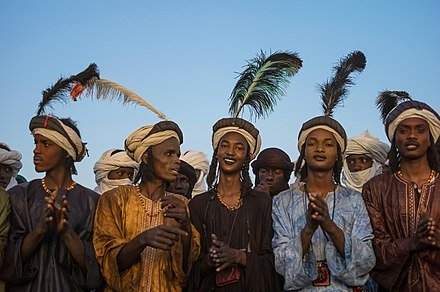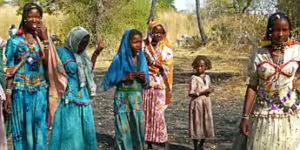The Fulani people, often recognized for their pastoral lifestyle and striking physical features, have a rich and complex history that spans many centuries and crosses several African nations. This article delves into their intriguing origins, cultural practices, and significant contributions to African history. Let's take a journey through time to uncover the origin of the Fulani people.
Who Are the Fulani People?

The Fulani people, also known as Fula, Fulbe, or Peul, are one of the largest ethnic groups in the Sahel and West Africa. They are primarily found in countries such as Nigeria, Senegal, Guinea, Mali, Burkina Faso, and Niger, among others. Their population is estimated to be around 40 million, making them a significant ethnic group in Africa.
Theories About the Origin of the Fulani People
There are several theories regarding the origin of the Fulani people, each offering a unique perspective on where they come from and how they came to be such a widespread and influential group.
The North African Connection
One popular theory suggests that the Fulani originated in North Africa or the Middle East. This hypothesis is supported by their physical characteristics, which often include lighter skin tones, narrow noses, and thin lips, traits commonly associated with North African and Middle Eastern populations. According to this theory, the Fulani migrated southward into the Sahel region, blending with the indigenous populations and adopting elements of their culture.
The West African Origin
Another theory posits that the Fulani people have their roots in West Africa. This theory is based on linguistic and cultural similarities between the Fulani and other West African ethnic groups. Proponents of this theory argue that the Fulani emerged as a distinct group within the region, developing their unique identity over centuries of interaction with neighboring communities.
The Nomadic Hypothesis
The nomadic lifestyle of the Fulani is another clue to their origins. Some researchers believe that the Fulani were originally a nomadic people who traveled across vast distances, which would explain their presence in so many different countries. This theory suggests that their constant movement allowed them to assimilate various cultural influences, creating the diverse and rich cultural tapestry that defines the Fulani today.
The Spread of the Fulani People
As the Fulani people migrated and expanded their territory, they influenced and were influenced by the various cultures they encountered. This section explores the different regions where the Fulani people have left their mark.
Nigeria
Nigeria is home to the largest population of Fulani people. They are predominantly found in the northern regions of the country, where they have traditionally engaged in cattle herding and farming. The Fulani in Nigeria have played a significant role in the country's history, particularly during the Fulani Jihad led by Usman dan Fodio in the early 19th century, which led to the establishment of the Sokoto Caliphate.
Senegal
In Senegal, the Fulani are known as Peul and are primarily found in the Fouta Toro region. They have a strong presence in the country and have contributed to its cultural and social landscape. The Fulani in Senegal are also known for their distinctive music and dance traditions, which are an integral part of the country's cultural heritage.
Guinea
Guinea is another country with a significant Fulani population. Here, they are known as Fula or Fulbe and are mainly concentrated in the Fouta Djallon region. The Fulani in Guinea have a rich history of Islamic scholarship and have been instrumental in spreading Islam throughout the region.
Mali
In Mali, the Fulani are known as Fulbe and are primarily found in the central and northern regions of the country. They have a long history of coexistence with other ethnic groups, such as the Tuareg and the Bambara. The Fulani in Mali have also been involved in various conflicts, particularly in recent years, as they navigate the challenges of maintaining their traditional way of life in a rapidly changing world.
Burkina Faso
The Fulani in Burkina Faso, known as Peulh, are found in various parts of the country, particularly in the northern and eastern regions. They have traditionally engaged in cattle herding and agriculture, and their presence has significantly influenced the cultural and economic landscape of Burkina Faso.
Niger
In Niger, the Fulani, known as Fulbe or Peulh, are primarily found in the western and southern regions of the country. They have a strong presence in the country and have been involved in various aspects of its history, from the pre-colonial period to the present day.
Fulani Culture and Traditions
The Fulani people have a rich cultural heritage that reflects their diverse origins and nomadic lifestyle. This section explores some of the key aspects of Fulani culture and traditions.
Language
The Fulani people speak Fulfulde, a language that belongs to the Niger-Congo family. Fulfulde has several dialects, which vary depending on the region. Despite these variations, the language serves as a unifying factor for the Fulani people across different countries.
Religion
Islam is the predominant religion among the Fulani people. They were instrumental in the spread of Islam in West Africa, and their religious practices are deeply intertwined with their daily lives. The Fulani have a rich tradition of Islamic scholarship and have produced many renowned scholars and clerics.
Nomadic Lifestyle
The Fulani are traditionally a nomadic people, known for their cattle herding practices. Their nomadic lifestyle has shaped their culture, values, and social structure. Cattle are central to Fulani life, not only as a source of livelihood but also as a symbol of wealth and social status.
Art and Music
Fulani art and music are vibrant and diverse, reflecting their rich cultural heritage. Their music often features traditional instruments such as the hoddu (a type of lute) and the riti (a single-stringed violin). Fulani art includes intricate jewelry, textiles, and body adornments, which are often used to signify social status and identity.
Marriage and Family
Marriage and family are important aspects of Fulani culture. Marriages are often arranged, and bride price is a common practice. Family structures are typically patriarchal, with extended families living together in large compounds. The Fulani place a high value on community and social cohesion, and family ties are central to their way of life.
The Fulani Jihad and Its Impact
One of the most significant events in Fulani history is the Fulani Jihad, led by Usman dan Fodio in the early 19th century. This movement had a profound impact on the Fulani people and the regions they inhabited.
Background of the Fulani Jihad
The Fulani Jihad was a religious and political movement that aimed to purify Islam and establish an Islamic state in the Hausa states of northern Nigeria. Usman dan Fodio, a Fulani scholar and cleric, led the movement, which quickly gained support among the Fulani and other ethnic groups.
The Establishment of the Sokoto Caliphate
The Fulani Jihad resulted in the establishment of the Sokoto Caliphate, a vast Islamic state that encompassed much of present-day northern Nigeria and parts of neighboring countries. The Sokoto Caliphate became a center of Islamic learning and culture, and its legacy continues to influence the region to this day.
Impact on the Fulani People
The Fulani Jihad had a significant impact on the Fulani people, solidifying their role as leaders and scholars in the spread of Islam in West Africa. It also led to the consolidation of Fulani power and influence in the region, shaping their identity and cultural practices.
Challenges Facing the Fulani People Today
Despite their rich history and cultural heritage, the Fulani people face several challenges in the modern world. This section explores some of the key issues they are dealing with today.
Conflict and Insecurity
The Fulani have been involved in various conflicts, particularly in the Sahel and West Africa. These conflicts are often fueled by competition for resources, such as land and water, and tensions between different ethnic groups. In recent years, the Fulani have been both victims and perpetrators of violence, leading to widespread insecurity and displacement.
Climate Change
Climate change is another significant challenge facing the Fulani people. As pastoralists, they rely heavily on the environment for their livelihood. Changes in weather patterns, such as prolonged droughts and unpredictable rainfall, have made it increasingly difficult for the Fulani to sustain their traditional way of life.
Economic Marginalization
Many Fulani communities face economic marginalization and limited access to basic services such as education, healthcare, and clean water. This marginalization has contributed to poverty and social exclusion, making it difficult for the Fulani to improve their living conditions.
Cultural Preservation
In the face of modernization and globalization, the Fulani people are working to preserve their cultural heritage and traditions. Efforts to document and promote Fulani language, music, and art are essential to ensuring that their rich cultural legacy is not lost.
Conclusion
The Fulani people have a rich and complex history that spans centuries and crosses numerous African countries. Their origins, while still a subject of debate, reflect a diverse and dynamic heritage that has shaped their identity and cultural practices. Despite facing significant challenges in the modern world, the Fulani continue to preserve their unique way of life and contribute to the cultural tapestry of Africa. Understanding the origin of the Fulani people helps us appreciate their enduring legacy and the vibrant cultures they maintain.
Frequently Asked Questions
1. Where do the Fulani people come from?
The origin of the Fulani people is subject to various theories, including North African, West African, and nomadic origins. They are currently spread across several countries in West Africa and the Sahel.
2. What is the primary language of the Fulani people?
The Fulani people speak Fulfulde, a language with several dialects that vary by region.
3. What is the predominant religion of the Fulani people?
Islam is the predominant religion among the Fulani people. They have a rich tradition of Islamic scholarship and have been instrumental in spreading Islam in West Africa.
4. What was the Fulani Jihad?
The Fulani Jihad, led by Usman dan Fodio in the early 19th century, was a religious and political movement aimed at purifying Islam and establishing an Islamic state in the Hausa states of northern Nigeria. It resulted in the establishment of the Sokoto Caliphate.
5. What challenges do the Fulani people face today?
The Fulani people face several challenges, including conflict and insecurity, climate change, economic marginalization, and efforts to preserve their cultural heritage.


